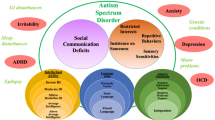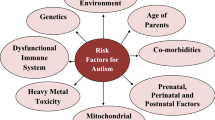Abstract
Elective mutism (EM) is not regarded as a separate diagnostic category in the ICD-9, but is included under the heading “313: Disturbance of emotions specific to childhood and adolescence.” In the ICD-10 EM is acknowledged as a separate diagnosis defined as “a marked, emotionally determined lack of speech in certain situations in a child with a normal or near normal speech/language ability.” The diagnosis excludes pervasive developmental disorder and specific developmental disorders of speech and language. Two patients referred for EM to a child and adolescent psychiatry outpatient clinic, showed specific developmental delays and assessment indicated slight mental retardation in one of them. The question arose regarding how extensively EM is reported in the literature as associated with developmental disorder/delay. A search was carried out in four data-bases where most references were listed under the keyword “mutism”. This paper presents the two case studies, and the results of the literature inventory. It concludes that EM may be associated with developmental disorder/delay and suggests that this could be a predisposing factor for an emotionally determined lack of speech in certain situations.
Similar content being viewed by others
References
Amman H (1958) Schweigende Kinder. Heilpaedagogische Werkblaetter 5:209–216
Bishop DVM (1994) Developmental disorders of speech and language. In: Butter M, Taylor E, Hersov L (Eds.) Child and Adolescent Psychiatry. Modern Approaches. (pp 546–568). Oxford: Blackwell Scientific Publications.
Black B, Uhde TW (1992) Elective mutism as a variant of social phobia. Journal of the American Academy of Child and Adolescent Psychiatry 31:1090–1094
Black B, Uhde TW (1994) Treatment of elective mutism with Huoxetine: A double blind, placebo-controlled study. Journal of the American Academy of Child and Adolescent Psychiatry 33:1000–1006
Brown JB, Lloyd H (1975) A controlled study of children not speaking at school. The Association of Workers for Maladjusted Children 3:49–63
Dow SP, Sorties BC, Scheib D, Moss SE, Leonard HL (1995) Practical guidelines for the assessment and treatment of selective mutism. Journal of the American Academy of Child and Adolescent Psychiatry 34:836–845
Goll K (1979) Role structure and subculture in families of elective mutists. Family Process 18:55–68
Golwyn DH, Weinstock RC (1990) Phenelzine treatment of elective mutism. Journal of Clinical Psychiatry 51:384–385
Hayden TL (1980) The classification of elective mutism. Journal of the American Academy of Child and Adolescent Psychiatry 19:118–133
Hesselman S (1981) Selektiv mutism hos barn. En refererande specialbibliografi over litteratur i Europa och USA med sammanfattande kommentarer. Stockholm: Psykologiförlaget (In Swedish).
Johansson-Jansson K, Theming JE (1976) Behandling av selektiv mutism hos ett finskt invandrarbarn i Sverige —en fallstudie. Report from Department of Psychology, Göteborg University,
Kaplan Tancer N (1992) Elective mutism. A review of the literature. In: Lahey BB, Kadzin AE. Advances in Clinical Child Psychology. New York: Plenum Press.
Kistler K (1927) Ein bemerkenswerter Fall von Freiwilligem Schweigem im Kindesalter. Zeitschrift für Kinderforschung 33:3–14
Klin A, Volkmar FR (1993) Elective mutism and mental retardation. Journal of the American Academy of Child and Adolescent Psychiatry 32:860–864
Kolvin I, Fundudis T (1981) Elective mute children: psychological development and background factors. Journal of Child Psychology and Psychiatry 22: 219–232
Krohn D, Weckstein SM, Wright HL (1992) A study of the effectiveness of a specific treatment for elective mutism. Journal of the American Academy of Child and Adolescent Psychiatry 31:711–718
Kupietz SS, Schwartz IL (1982) Elective mutism. Evaluation and behavioral treatment of three cases. New York State Journal of Medicine June:1073–1076
Kurth E, Schweigert K (1972) Ursachen und Entwicklungsverlaufe des mutismus bei kindem. Psychiatrie, Neurologie and Medizinische Psychologie 24:741–749
Labbe EE, Williamson DA (1984) Behavioural treatment of elective mutism: A review of the literature. Clinical Psychology Review 4: 273–292
Lachenmeyer JR, Gibbs MS (1985) The social-psychological functions of reward in the treatment of a case of elective mutism. Journal of Social and Clinical Psychology 3:466–473
Lebovici S, Diatkine R, Klein F, Diatkine-Kalmanson D (1963) Le mutisme et les silences de l'enfant. Psychiatrie de l'Enfant 6:79–138
Lorand B (1960) Katamnese elektiv mutisticher Kinder. Acta Paedopsychiatrica 27:273–289
Meijer A (1979) Electiv mutism in children. Israel Annals of Psychiatry and Related Disciplines 17:93–100
Paisse JM (1972) A case of psychological muteness in a young child with cerebromotor disability. Annales Medico-Psychologiques 2:227–239
Popella E (1960) Psychogener Mutismus bei kindem. Nervenarzt 31:257–263
Radford P (1977) A psychoanalytically based therapy as the treatment of choice for a six-year-old elective mute. Journal of Child Psychotherapy 4:49–65
Røsler M (1981) Befunde beim neurotischen Mutismus der Kinder eine Untersuchung an 32 mutistischen Kindern. Praxis der Kinderpsychologie under Kinderpsychiatrie 6:187–194
Schenk-Danziger L (1961) Sprechverweigerer in der Schule. Psychologische Praxis 29:167–174
Steinhausen H-C, Juzi C (1996) Elective mutism: An analysis of 100 cases. Journal of the American Academy of Child and Adolescent Psychiatry 35:606–614
Søltoft-Jensen P (1975) Elektiv mutisme i skolepsykologisk praksis. Skolepsykologi 1:3–16 (In Danish)
Treitel L (1894) Grundriss der Sprachstoerungen, deren Ursache, Verlauf und Behandlung. In: (pp Berlin: A Hirschwald.
Wergeland H (1979) Elective mutism. Acta Psychiatrica Scandinavica 59:218–228
WHO (1978) International classification of disease (ICD-9) (9th ed). Geneva: Author.
WHO (1992) The ICD-10 Classification of Mental and Behavioural Disorders. Clinical descriptions and guidelines. Geneva: Author
Wilkins R (1985) A comparison of elective mutism and emotional disorders in children. British Journal of Psychiatry146: 198–203
Wright HH, Miller D, Cook MA, Littman JR (1985) Early identification and intervention with children who refuse to speak. Journal of the American Academy of Child and Adolescent Psychiatry 24:739–746
Wright HH, Holmes G, Cuccearo ML, Leonhardt TV (1994) A guided bibliography of the selective mutism (elective mutism) literature. Psychological Reports 74:995–1007
Wright HL (1968) A clinical study of children who refuse to talk in school. Journal of the American Academy of Child Psychiatry 7:603–617
Author information
Authors and Affiliations
Rights and permissions
About this article
Cite this article
Kristensen, H. Elective mutism —associated with developmental disorder/delay. Two case studies. European Child & Adolescent Psychiatry 6, 234–239 (1997). https://doi.org/10.1007/BF00539931
Received:
Accepted:
Issue Date:
DOI: https://doi.org/10.1007/BF00539931




